Is a Gluten-Free Diet Right for You?
This post may contain affiliate links. As an Amazon Associate, I earn from qualifying purchases. Please read my disclosure.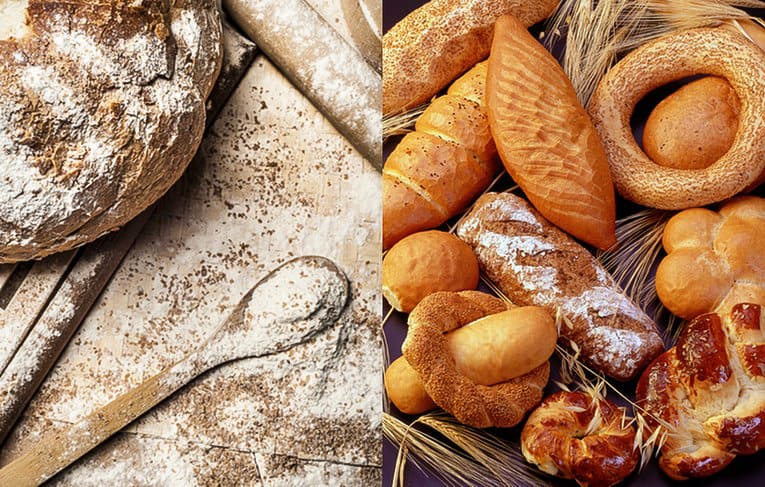
Should you “go gluten-free”?
That’s a question I hear a lot, especially since gluten-free foods are everywhere.
There is gluten-free bread, pasta, cookies, cakes, cupcakes — the list could go on and on! So is gluten-free the newest fad diet or is there really something to it?
My answer is: it depends.
Whether or not a gluten-free diet is right for you depends on one of three scenarios:
- If you have been diagnosed with celiac or are gluten-intolerant
- If you want to avoid sugar (for weight loss, diabetes or general health)
- If you have tummy troubles and want to try something new
But before I get into that – I want to address: What is gluten? And what products have gluten in them?
The short answer: Anything with wheat in it has gluten in it.
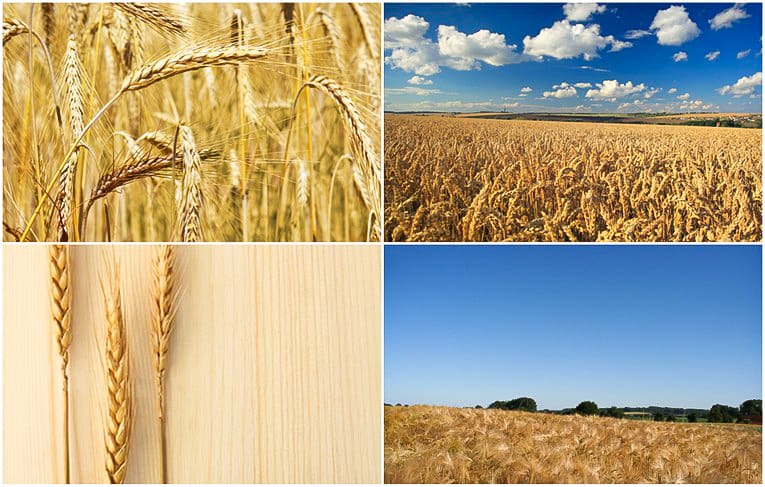
Gluten is the protein found in all wheat grains (including barley, semolina, rye, and spelt – among others). Gluten gives dough its elasticity and its yummy, fluffy, chewy texture. That freshly baked bread texture – that is all gluten. Oats, while technically gluten-free, are often processed in facilities that also process wheat – so they become cross contaminated and can’t be considered “gluten-free,” unless they are labeled as such.
Obviously foods like: bread, pasta, cookies, cakes, muffins, pies, cereals, pizza, pretzels, etc. have gluten in them. But there is gluten hidden in lots of other foods like: blue cheese, oatmeal, soy sauce, seitan (which IS gluten), chutneys, sauces, instant coffee and even some curry powders!
It’s easy to see why a gluten-free diet is one of the new “diets” out there – cutting out all of those delicious baked goods would help with weight-loss — since most of those foods are calorie-dense and easy to indulge on!
So now, back to the question: should you be avoiding all of these foods?
If you fall into…
Scenario 1: You suffer from celiac disease or are gluten-intolerant. That means you should be going 100% gluten-free, 100% of the time.
About 1% of the population suffers from celiac disease, a “serious digestive and autoimmune disorder that results in damage to the lining of the small intestine when foods with gluten are eaten” (source: WebMD). For people with this condition, going 100% gluten-free is the only treatment option. Some people aren’t diagnosed with celiac disease but do have allergic reactions or intolerant reactions to gluten (achy joints, rashes, nausea, bloating, etc.) — and going gluten-free can be beneficial for them as well if it alleviates their symptoms.
If you fall into…
Scenario 2: You want to avoid sugar (for weight loss, diabetes or general health). That doesn’t necessarily mean you have to go gluten-free.
If you don’t see any digestive problems when eating gluten products, then there is no real reason to go 100% gluten free. But – if you want to cut back on your sugar intake, eating less refined / high glycemic products will be helpful. And with that could come avoiding wheat and all of the more “junky” gluten products like baked goods, pastas, etc.
But be careful – don’t just eat a “gluten free muffin” instead of a “regular muffin” – you will likely still be getting all of the fat, calories, and carbs from the gluten free muffin — but it’ll have less fiber and may even be more processed to achieve the same muffin-like texture without wheat flour. Instead, try switching to whole wheat or sprouted wheat products, and eat less of them throughout the day. Swap out high sugar drinks and desserts for water, dark chocolate, and healthy snacks like apples and nut butter. That way you’ll be going partially gluten-free, but not so extreme that it will be hard to sustain long term.
If you fall into…
Scenario 3: If you have tummy troubles and want to try something new. Then you should try a gluten-free diet and see how you feel.
Lots of people have undiagnosed “tummy troubles” – and if you’re one of those people, doing an elimination diet and avoiding gluten might be a way to see if you have a sensitivity to it that hasn’t been detected yet. Basically, what you do is start with eliminating gluten 100% from your diet for a couple weeks. Then slowly add gluten back in and see if you feel worse, better, or feel no change. That way you can gauge whether gluten is, in fact, the culprit for your tummy troubles.
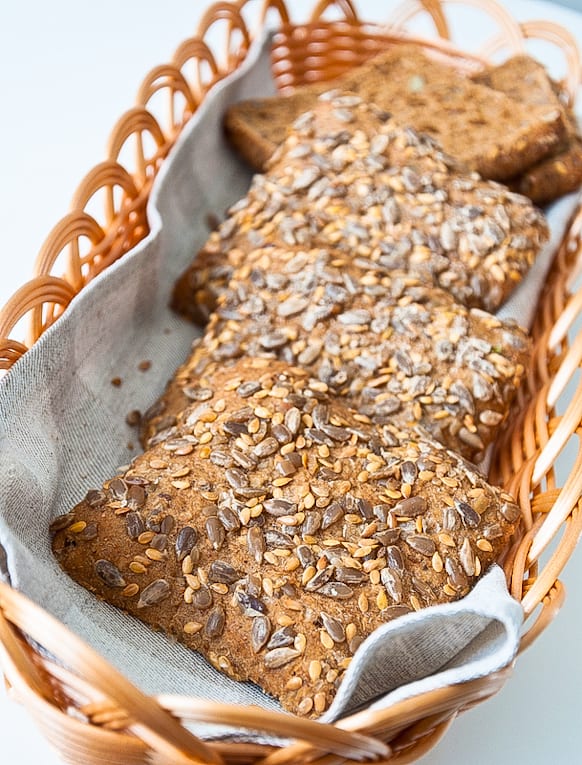
So what’s the bottom line – should you go gluten-free?
It all depends on your particular situation and health needs. Be sure to talk to your doctor first. Then try it out and see how you feel. You may not notice a difference at all, or you may end up feeling amazing – better than you have in years. If you’re thinking about starting a gluten-free diet, try some of these recipes to get you going! And if you’re trying to lose weight, focus on achieving a balanced approach versus cutting out one type of food altogether. Of course, there’s no “one-size-fits-all” diet, so knowing your own body and your own needs is essential to staying healthy and choosing the best plan for you!
Have any of you gone 100% gluten free or have started avoiding gluten? How has it worked for you?



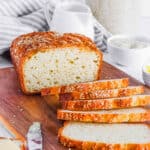






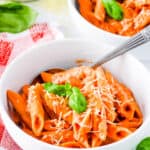


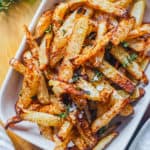



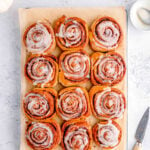
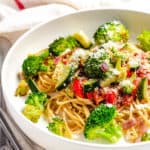
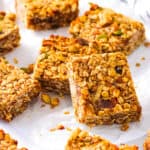


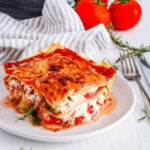

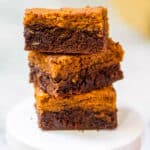
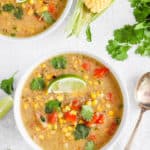





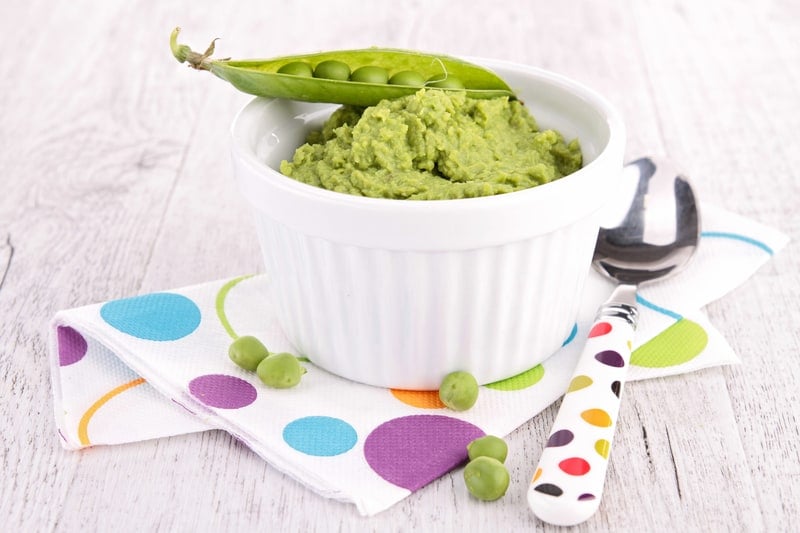
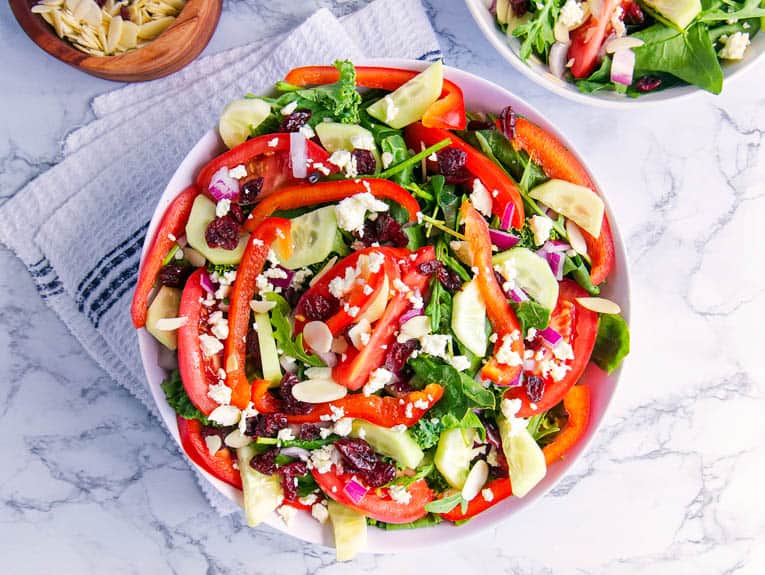


My wife is gluten free and I agreed to try it for a month. I went six weeks and felt no difference physically. I had no out of the ordinary occassional stomach or bowel problems. According to my wife (who researches everything) tells me it will keep my intestinal tracks healthier and function better. She also tells me that gluten “plays” with your immune system and interferes with letting your body absorb the nutrients it needs. Before I went GF I prepared meals with her in mind which I ate but would also eat “regular” food as well. My question is, will going back to that balancing act of GF and non GF foods (for me) have any benefits. I am assuming it will do no harm.
Hi Dean! Given that you don’t have any food allergies or gluten sensitivities, there is no harm with going back to a partial gluten free and also gluten-full diet 🙂 I don’t think you will feel any difference at all. Gluten does “play” with the immune systems of people who have allergic reactions/sensitivities to it or people who have celiac disease, but for everyone else, gluten does no harm. Hope that helps! Keep me posted on how it goes!
It can be really difficult to go on a gluten-free diet since all forms of wheat have gluten. But I love your creative recipes! Thanks a lot!
Completely agree Chelsea! And I’m so glad you like my recipes – thanks so much! 🙂
Hi 🙂
I’m 18 and I experimented a lot with my parents because since I was born I had stomach aches every single day & I am bloated 24/7. I realized that it would be better for me to eat a gluten-free diet but I can’t do it. I don’t really know why – I ate rice cakes instead of bread (cause I don’t really like the gluten-free bread, I don’t like the taste and texture) and tried other different things as substitutes but I was always hungry and craving baked goods. I’m not sure if I’m addicted to gluten but this gluten-free diet freaked me out.
I don’t know if it’s only me but I struggle so hard – I think I could lose some weight and stop my health problems with going gluten-free- but it’s still don’t seem to be able to change my lifestyle.
Do you have any advice or know people who have the same kind of problems?
It’s so difficult for me to not eat bread,noodles,cookies and all the other foods teenagers and adults like to indulge in 🙁
Hi Agata! Thank you so much for reaching out! I’m so sorry to hear about your struggles with going gluten-free — trust me you are not alone! 100% gluten-free is a very strict diet to follow (but there are a lot of things you can still eat!) But before we get into all that – have you had an actual diagnosis of celiac? Have you seen your doctor about your stomach aches and other tummy troubles? If not, that would be the best place to start – because they can test you to see if you’re actually gluten intolerant or if you have celiac (or if something else is going on). Either way, I’ll email you right now so we can continue this conversation over email since I think that will be easier 🙂 I truly wish you all the best and don’t worry! You will be able to get through this. Talk to you soon!
I was excited to discover this site. I wanted to
thank you for your time due to this fantastic read!
! I definitely liked every little bit of it and I have you book-marked to check out new stuff on your blog.
No problem, so glad you found it helpful!
This was a very insightful post, I’ve been considering gluten free for a while now…
Thanks Chloe!! I hope this helped you to make an informed decision!
I really liked this post because I think because of so much publicity and marketing, people easily fall into the trap of gluten-free diet. I completely agree with all your scenarios and I wish people would research little bit more and look into credible sources before jumping into gluten free wagon.
And you’re a dietician! Thats high praise. Thank you 🙂 Yeah, I have a friend with celiac and I see him struggle with nutrition so much, it seems silly to use something so unsustainable for just weight loss if you don’t absolutely have to for health reasons.
Thank you so much Dixya!! That means a lot coming from you! And yes – that’s exactly why I felt compelled to write this post – to help anyone considering going gluten-free to make an informed, healthy decision that’s right for them. I have friends who actually have celiac – and gluten-free 100% of the time is a big undertaking if it’s not absolutely necessary for health reasons!
Gluten free diets are definitely a fad with celebrities promoting it as a way of justifying their completely rational choice (because its their JOB to look pretty and thin) to exclude bread and processed wheat products to keep their body weights artificially low in an age where confessing to dieting and subsisting on yogurt is quickly becoming gauche. Gluten free diet, as any celiac will tell you, is a major pain in the ass. It often is accompanied by lactose intolerance which severely limits your options for nutrition and it should be regarded as such. Not many celiac would choose that lifestyle simply because its a. expensive b.lacks a lot of vitamins and other nutrients c.PASTA!
Though I admire the willpower required to stick to smoothies for dinner or veggies as snack, it would make me anorexic. I do mean that in the literal sense of the word. I would lose as many calories as is included in 2 or 3 of those meals in one workout. I would effectively start losing muscle mass.
I think moderation is for sure the key here, especially for women – who lose bone density the older we get, especially if you are already replacing dairy products for less caloric options like nut milk and soy yogurt. We lose a tremendous amount of nutrition simply being women with jobs and a life. Lots of great whole grains include gluten like kasha, wheatberries, bulgur and barley. These are key ingrediants in replacing overly sugary(and milky) breakfast and lunch options. I know lots of people struggle with weight loss and gluten free is a simpler option than figuring out High Intensity Cardio workouts let alone doing them but it takes one good cheesecake to start slipping on gluten free but exercise is an addiction with a high, you will never WANT to stop.Also, tight body > thin body… amiright? :p
Thank you so much for sharing your thoughts Kaya! I completely agree with you – I couldn’t live on smoothies all day either! I would starve and go crazy 🙂 Veggies or fruit as a snack is great though, as long as you pair it with a protein (like apples and nut butter are one of my favorite snacks). And yes!! If you want to lose weight – healthy eating + exercise is the key. A thin body isn’t necessarily the most healthy – it’s all about achieving that healthy balance that’s right for each individual person. I’m a big advocate for the “no diet diet” — because you really don’t have to go on a special diet to lose weight as long as you’re eating 80% healthy and 20% less-healthy-in-moderation!
It’s so nice to see someone bringing up this topic. Being “gluten-free” has become somewhat trendy lately but I don’t think many people actually take the time to research why it benefits some people. Awesome to see you break it down in such an accurate way!!!
Thanks so much Rachel! The reason you mentioned was exactly why I wrote it – I also felt like being “gluten-free” was becoming like the latest diet trend, so I wanted to address when it might work vs. when it doesn’t. I’m so glad this post was helpful and made sense to you 🙂
My daughter went off wheat to battle asthma and solved a couple of other health issues – like cyclic vomiting, an abdominal migraine. Triggers (for her it was colds) cause round the clock vomiting for 24+ hour periods. It also helped clear her skin and she stopped suffering fatigue that we were putting down to an iron deficiency (her iron levels tested fine right before she gave up wheat).
I gave up wheat so that at least one other person in the household was eating like her – it makes things easier. I dropped 30 pounds and found new energy. Might have been due to not eating wheat or losing weight or both. Now when I eat wheat products, I feel bloated and tired.
Neither of us has suffered from cutting wheat suddenly. She eats gluten free breads, etc., but mostly we tend to just eat whole foods and avoid wheat rather than try to replace it.
Hi Suzanne! Oh my gosh – your daughter’s ordeal (prior to going wheat free) sounds so awful!! What a hard experience for her to go through. It’s so great that you realized that gluten/wheat was a trigger and that her health has improved so significantly! And congratulations to you on the weight loss!! That is amazing – you should be really proud of yourself 🙂 And you brought up a great point – if you are going to go gluten-free, it’s better to just “crowd out” the wheat products with whole fruits, veggies, non-gluten grains like quinoa and rice, and lean proteins. Thanks so much for sharing your experiences!
I’m pretty sure I don’t have a problem with gluten specifically, since I don’t have any stomach problems, chronic fatigue, etc., but I do find that I feel better when I get some variety to the grains in my diet as well as focusing on whole grains rather than flours, since flours go stale a lot more quickly. For example, instead of having my soup with bread–even whole wheat with no preservatives–I’ll cook up some farro and mix it in.
I also think that it’s important not to approach it as a diet that will automatically be right for everyone; also, I’ve heard that cutting all grains out of your diet at once (unless you’ve discovered an allergy or celiac’s disease) can be too sudden a change for your body and that some of the effects you feel will be due to that rather than the fact that you’ve given up grains.
Hi Magdalen! Your experience sounds a lot like my husband’s – he doesn’t have any problems with gluten or grains, but does feel lighter/healthier when we have whole grains, more variety, and less baked goods — just like you mentioned. I love the idea of using a whole grain like farro or brown rice or quinoa instead of a slice of bread – I’ll do that often in my cooking as well! And absolutely – no one diet is right for everyone – and cutting out any major food group in an extreme way is not the best way to go (unless, like you said, there is an allergy or health condition involved). Thanks again!!
I first tried out the primal lifestyle before Thanksgiving. My mom and dad did it, too, because one has diabetes and the other has lupus. I’d read that both of those diseases can benefit from going gluten and grain free.
For me, it was primarily weight loss. We did it, and my mom and dad in particular were never hungry. It was really tough for me because I’m mostly vegetarian. During the holidays, though, was when we really noticed a difference. We went off primal, and we all felt horrible. The thing was, we had felt that way before and really didn’t realize it.
Now I’m back to a mostly primal diet, and the biggest change has been my prep. I’ve realized that if I don’t prep for the week, I will grab the easy thing. And that’s usually a muffin. I also didn’t replace grains with a grain-free version of whatever it is. Then you’re not really changing.
So, for example, this week I made egg cups: eggs, spinach, bell pepper, and a little good (unprocessed) cheese. For lunch, I have black bean soup. For dinner, I am doing green smoothies, and if I’m still hungry, a side of veggies or a turkey wrap. That turkey wrap would be my only grains all day. I gained a lot of weight last year, and I’m hoping to take it off this way.
Thank you so much for sharing your story Jenn! Your experience is proof that you can go gluten-free without eating super processed packaged foods. With the turkey wrap — do you use a gluten free tortilla or just a regular whole wheat tortilla? Good luck on your weight loss journey – and keep me posted on how things go! 🙂